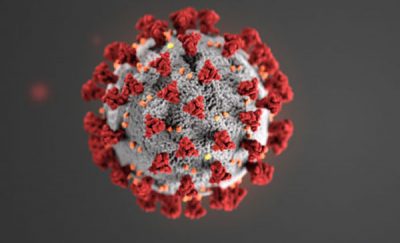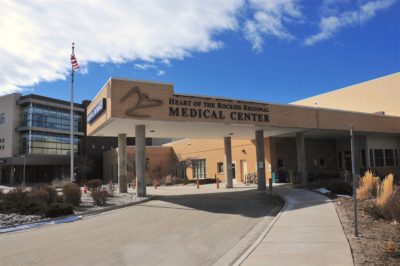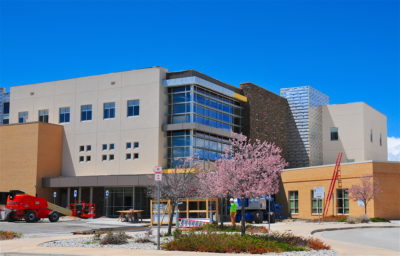Chaffee County residents and the rest of the country appear ready to leave COVID behind. The masks are off and summer parties are on. Even with collective wishful thinking, COVID-19 continues to linger for some, in a syndrome that is referred to as “Long COVID”.
The virus itself remains as the Delta strain is spreading, while still shuttered businesses, and the surge of new arrivals thriving on remote work showcase the continued economic and social impact. Despite COVID’s persistence, for those who escaped the worst of it, life feels normal again.
 Chaffee County resident Ann Croghan knows there is no easy return to normal after her COVID diagnosis in October 2020. Croghan, who works as a physical therapist at the Heart of the Rockies Regional Medical Center (HRRMC), stopped going to work during her COVID quarantine.
Chaffee County resident Ann Croghan knows there is no easy return to normal after her COVID diagnosis in October 2020. Croghan, who works as a physical therapist at the Heart of the Rockies Regional Medical Center (HRRMC), stopped going to work during her COVID quarantine.
Even as she quarantined, her symptoms were relatively minor – some leg and eye pain plus insomnia. No one else in her household got sick and she wasn’t hospitalized. A couple of weeks after the quarantine ended, when the symptoms abated and she thought the worst was over, she went for a hike with her kids.
Croghan’s life changed after that hike. During her hike, she thinks she had undiagnosed myocarditis, inflammation of the heart that’s been associated with COVID. The ten-year physical therapist and mother of three started experiencing unusual symptoms. “My heart was racing anytime I would go up or downstairs. I would feel like I had drunk a pot of coffee,” said Croghan.
She checked her oxygen levels and found them dangerously low — in the 80 percent range. The best solution was supplemental oxygen. She’s been toting oxygen everywhere she goes since December.
Before her symptoms, Croghan was an active person. “I took my kids hiking and I could sling them up the mountain,” said Croghan. Now she has trouble walking from the car to the store. Her doctors still don’t know what’s causing her low oxygen levels.
Even with her life-altering symptoms, Croghan counts herself as lucky that she can still go to work and play with her kids. After visiting online post-COVID support groups she says she understands how lucky she is after seeing how severe the continued physical effects are for some.
In an effort to alleviate symptoms, Croghan used her medical training to develop an exercise plan for herself but struggled at the beginning.
“When we first started the exercise program I kept getting severely depressed, I had brain fog, and would have trouble functioning.” She attributes some of those symptoms to low oxygen. Croghan realized that if she was challenged to make her own exercise program, then it was really important for others to have a place they could go for help recovering from COVID. She turned to her colleagues.
HRRMC’s Post-COVID Rehab Clinic
Croghan’s experience inspired some of her coworkers at HRRMC to create a specialty clinic for post-COVID rehabilitation. The Post-COVID Rehab Clinic was started by Physical Therapist (PT, DPT, CCS) Sarah Nazzaro and Clinical Exercise Physiologist David Velsor. Velsor and Nazzaro wanted to help people with lingering issues related to COVID just like their friend and fellow medical provider, Croghan.

Heart of the Rockies Regional Medical Center in Salida. Photo by Dan Smith.
The clinic offers initial evaluations and custom plans based on the person’s test results and reported symptoms. Velsor highlights the clinic staff’s goal and expertise.
“We want to provide the highest quality care we can. We’ve got an incredible staff here with physical therapists, occupational therapists, speech therapists, clinical exercise physiologists, and awesome physicians.”
Post-COVID symptoms rarely show up identically in patients; some of the slowest to recover had mild cases of COVID. “Each patient is so different and we address each patient as their own and formulate the best treatment,” said Velsor.
Nazzaro described the clinic team’s focus as restoring the quality of their patients’ lives. “Healthy people that get COVID also have complications afterward that really impact their quality of life. Whether that’s working, exercising, taking care of a family member, or being able to remember your grocery list.”
One of the commonalities that Velsor and Nazzaro see in post-COVID patients is the feeling of being alone. Many people with post-COVID symptoms went through sickness, quarantine, and slow recovery, all with limited human interaction. Velsor and Nazzaro say they want to be sure that post-COVID patients know they’re not alone.
“The feelings of shortness of breath and brain fog and other symptoms are troubling because they may not know anyone else experiencing them. Especially in a smaller community. They aren’t the only ones experiencing those symptoms and there are things we can do to help and try to mitigate some of these issues,” said Velsor.
The Post-COVID Rehab Clinic is open to all. There are two ways of referral – through a primary care provider or self-referral. Interested parties can talk to their provider at HRRMC or they can call HRRMC Wellness at 719-530-2200 ext. 2057.
Nazzaro detailed the clinic’s coverage explaining, “The initial assessment is a $20 cash payment and any type of therapy is covered by insurance. Exercise physiology is cash pay and there is financial assistance available.”
Nazzaro emphasizes that anyone who thinks they could benefit should make an appointment. “We don’t want finances to be a barrier for someone to get the help they need. If finances are a concern, we’ll have a discussion and try to find the best solution for them.”
“If you had COVID and you’re suffering to some degree, whether you have brain fog, low energy or fatigue, or have pain, we want to help you get back to doing what you were doing before COVID. If you’re suffering and anything is going on, just call us. We don’t want our community to suffer and to feel alone in any of this,” added Nazzaro.
“Have compassion”
Even as the state and the county transitions toward more normalcy, Croghan is still adapting to her situation.
“My goal is to go on a family walk with my children and be fine. I don’t know if I’ll ever be better or not. If I can walk with oxygen, that’s what really matters.” She spoke directly to anyone with post-COVID symptoms. “So everyone out there struggling: ask for help, be an advocate for your wellness, have hope.”
Croghan also had a message to the community. “Have compassion and help those with post-COVID feel heard and supported and loved.”








Recent Comments